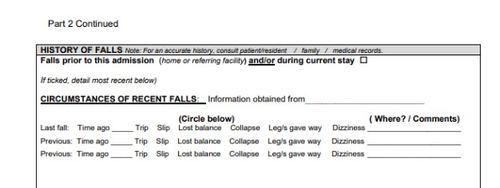The 15-Second Trick For Dementia Fall Risk
The 15-Second Trick For Dementia Fall Risk
Blog Article
All about Dementia Fall Risk
Table of ContentsThe Dementia Fall Risk IdeasGetting The Dementia Fall Risk To WorkDementia Fall Risk for BeginnersThe Greatest Guide To Dementia Fall RiskNot known Factual Statements About Dementia Fall Risk
Ensure that there is a marked location in your clinical charting system where personnel can document/reference scores and document appropriate notes related to drop avoidance. The Johns Hopkins Fall Danger Assessment Device is one of lots of tools your team can utilize to aid prevent damaging clinical occasions.Person drops in health centers prevail and incapacitating adverse occasions that persist in spite of years of effort to decrease them. Improving communication throughout the examining nurse, treatment team, patient, and individual's most involved buddies and family members may reinforce loss avoidance initiatives. A team at Brigham and Female's Healthcare facility in Boston, Massachusetts, sought to create a standard loss avoidance program that focused around enhanced communication and individual and family members involvement.

The technology group stressed that effective execution depends upon patient and personnel buy-in, combination of the program into existing workflows, and integrity to program procedures. The group noted that they are grappling with how to make sure continuity in program execution throughout durations of situation. During the COVID-19 pandemic, as an example, a rise in inpatient drops was associated with restrictions in client interaction together with restrictions on visitation.
Everything about Dementia Fall Risk
These events are commonly taken into consideration avoidable. To execute the intervention, companies need the following: Access to Loss TIPS sources Autumn pointers training and retraining for nursing and non-nursing personnel, including new nurses Nursing operations that enable person and family involvement to carry out the falls assessment, ensure use the avoidance strategy, and carry out patient-level audits.
The outcomes can be very detrimental, frequently increasing individual decrease and causing longer healthcare facility remains. One study approximated keeps raised an extra 12 in-patient days after a client loss. The Autumn TIPS Program is based upon appealing people and their family/loved ones throughout three primary processes: evaluation, customized preventative interventions, and auditing to guarantee that individuals are participated in the three-step autumn prevention procedure.
The person evaluation is based upon the Morse Loss Scale, which is a validated fall threat assessment tool for in-patient hospital settings. The range includes the six most typical factors people in health centers drop: the person loss history, high-risk problems (including polypharmacy), use of IVs and other external tools, mental condition, gait, and movement.
Each danger variable relate to several workable evidence-based treatments. The nurse develops a plan that incorporates the interventions and is noticeable to the care team, client, and family on a laminated poster or published visual aid. Nurses develop the strategy while meeting the individual and the patient's family members.
Get This Report about Dementia Fall Risk
The poster works as a communication device with other members of the individual's care team. Dementia Fall Risk. The audit element of the program consists of examining the individual's expertise of their risk factors and prevention strategy at the device and healthcare facility levels. Registered nurse champions perform at least five individual websites interviews a month with individuals and their households to check for understanding of the loss avoidance plan

An estimated 30% of these drops result in injuries, which can vary in intensity. Unlike other go to my blog adverse events that call for a standard scientific response, fall avoidance depends highly on the needs of the individual.
Dementia Fall Risk for Beginners

Based on bookkeeping results, one site had 86% conformity and 2 websites had over 95% conformity. A cost-benefit evaluation of the Fall TIPS program in eight hospitals approximated that the program expense $0.88 per patient to carry out and resulted in financial savings of $8,500 per 1000 patient-days in straight expenses connected to the avoidance of 567 tips over three years and 8 months.
According to the advancement team, companies curious about executing the program must conduct a readiness evaluation and falls avoidance gaps evaluation. 8 Furthermore, organizations must guarantee the essential framework and process for application and create an implementation strategy. If one exists, the company's Fall Prevention Job Force should be included in preparation.
How Dementia Fall Risk can Save You Time, Stress, and Money.
To start, companies ought to make certain conclusion of training modules by nurses and nursing aides - Dementia Fall Risk. Hospital staff ought to evaluate, based on the requirements of a medical more info here facility, whether to make use of a digital health document hard copy or paper variation of the loss prevention plan. Applying groups must recruit and educate registered nurse champs and develop processes for bookkeeping and coverage on autumn data
Team need to be included in the process of revamping the operations to involve individuals and family in the assessment and prevention plan procedure. Equipment ought to be in place so that units can recognize why a loss happened and remediate the cause. A lot more specifically, registered nurses must have networks to give ongoing feedback to both team and unit management so they can change and enhance fall avoidance operations and connect systemic issues.
Report this page